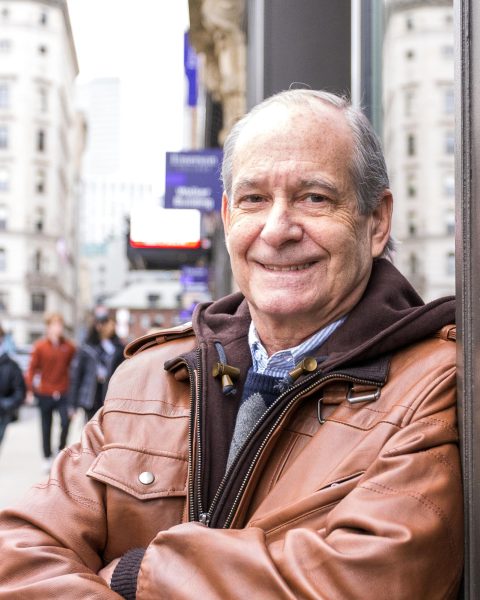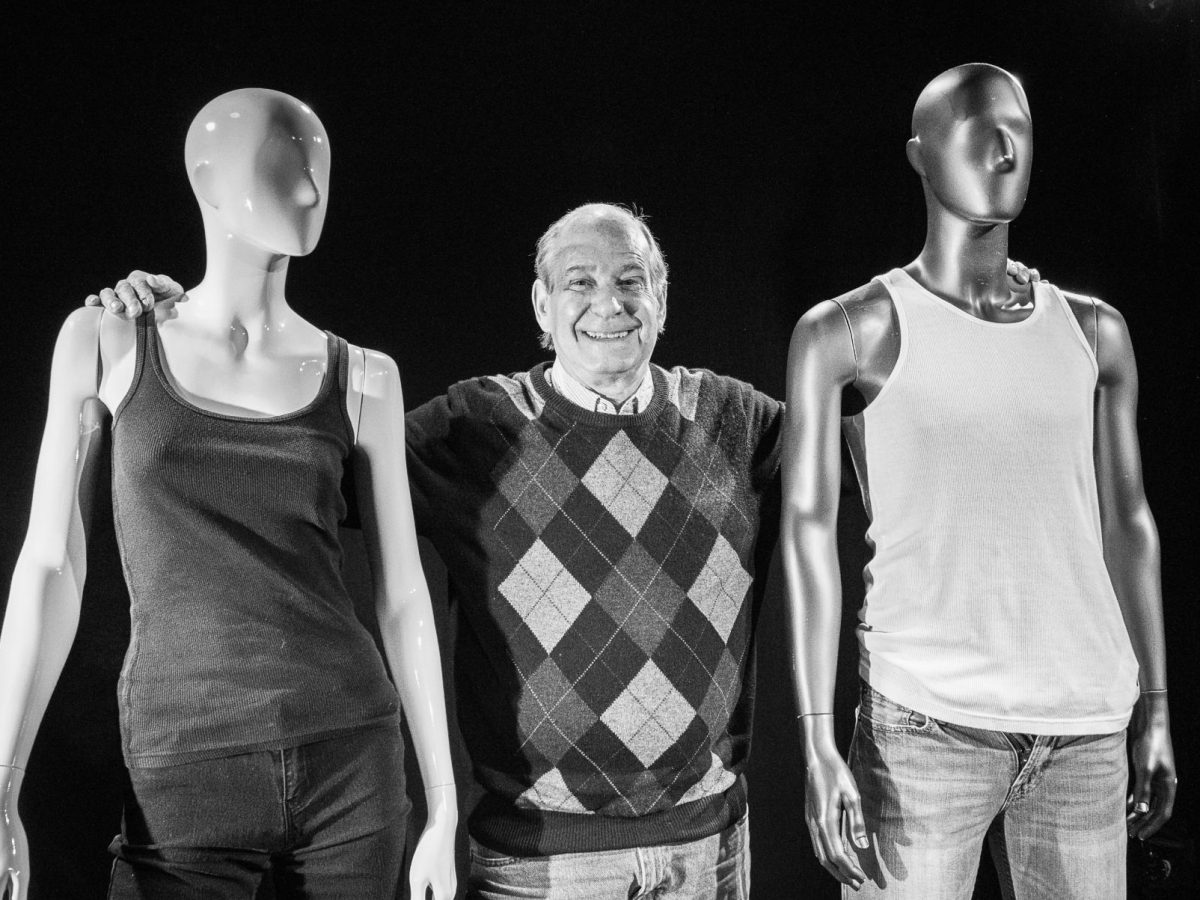Emerson professor Scott Pinkney’s career in lighting design has lasted over 50 years and culminated in around 1,200 productions, 450 to 500 of which were plays. Now, reflecting back as he approaches retirement, Pinkney sees where his professional inspiration came from.
Pinkney’s father worked as a commercial interior designer for department stores. During the holidays, he brought home large plastic ornaments, which he hung on the tree in their front yard. A floodlight at the tree’s base cast reflections that danced across the branches and leaves. One night, Pinkney went out in the snow to analyze the movement of the light, and when his mom came outside, she questioned why he had been standing there for hours. Pinkney thought it had only been minutes.
“I got lost in that world of light and shadow and highlight,” Pinkney said. “Now looking back at that, I realized that was the moment I came to understand that light was something living. I was probably 20 years old before I realized the significance of that moment in my life.”
Pinkney started teaching full-time as a lighting design and business of design professor at Emerson in 2004. Before that, he guest-designed an Emerson play, “Red Noses,” in 1992. He taught master classes, guest lectured, participated in guest artist work, and started using Emerson students as his professional assistants upon graduating. Because of his involvement, Pinkney was asked to work as a professor for a year while they searched for a permanent placement. He later applied for that position and has been a fixture in the department for 20 years.
“I had always sworn I would never teach,” Pinkney said. “I drove from the Cape up to Boston for my first day of classes and I was so nervous that I stopped halfway, got out of the car, and threw up,”
“I was so nervous about officially teaching,” Pinkney recalled. “[But] I loved it. I absolutely loved it.”

Pinkney developed a business class for designers, drawing on the business knowledge he wished he had before starting his design career. The class covers reading and interpreting contracts, managing insurance, taxes, and other business elements. It started as a directed study for four students and has since become one of Pinkney’s most popular classes.
“I can’t think of anything I’m more proud of than my students over the last 20 years,” Pinkney said. “The way I approach teaching is [where] I’m a guide. I’m not going to tell a student how to be an artist. That comes from inside … What I do is help guide that art.”
Theatre design and technology senior Mia Moore first met Pinkney during her Emerson audition. He took a particular interest in the photography portfolio she showcased.
“I think he’s one of the real reasons I got into Emerson,” Moore said.
Since then, Moore has had Pinkney as a professor for her four years on campus for lighting design courses and his business of design course.
“He takes the time to explain something if you don’t understand it, especially if you don’t have a lot of background knowledge,” Moore said. “He’ll try to make whatever he’s talking about accessible to you and he uses a lot of personal experiences and stories to give context to things that he’s describing.”
“I know Emerson will feel the weight of his leaving,” Moore said, reflecting on Pinkney’s retirement.
Pinkney’s lighting design experience started in high school, where he acted in school plays and musicals. He shared the stage with peers who would go on to sing at the Metropolitan Opera or be a voice actor in Disney’s “Beauty and the Beast.”
Pinkney “realized if [he] was going to make a living in theater, it certainly wasn’t going to be as a performer.”
One of his teachers asked if he considered design. This question led to a career involving lighting design for presidential candidates Bill Clinton and Mitt Romney, the Smithsonian Art Museum, an Elvis Presley bronze bust, and more.
“That high school teacher changed the direction of my life entirely. It was one of those serendipitous moments where everything changes,” Pinkney said.
“I started to realize I visualized things differently than other people,” Pinkney explained. “I saw things in my head and had an affinity for lighting and that changed my life.”
Pinkney did not think he could make a sustainable living in the theater industry while applying to college, so he spent his first year as a psychology major. He got sick during that first year, leading him to spend almost a year in the hospital. When he was released, his perspective had changed.
“I don’t care if I can make a living. I’m going to do what I love,” Pinkney recalls thinking.
Later that year, he transferred to Boston University and received a BFA in lighting design.
“I didn’t turn to actually pursuing lighting design until I stopped worrying about pursuing a normal path,” Pinkney said.
Pinkney tried his hand at lighting design the summer before his first year at Boston University by doing a season of Summer Stock at a theater in Cape Cod.
While at Boston University, Pinkney participated in designing shows “wherever [he] could.” He worked for three seasons with College Light Opera Company as the scenic and lighting designer, designing 10 shows in 10 weeks. For his senior project, Pinkney designed shows at Boston University’s Huntington Theatre and moved to New York City right after his senior year, not even making it to his commencement ceremony.
Upon moving to New York, Pinkney landed a job at Kliegl Brothers Universal Electric Stage Lighting Company, a company that no longer exists but was the country’s first electric stage lighting manufacturer. Pinkney learned about the architectural side of lighting design and worked in small, intimate settings like church basements to design off-Broadway productions.
“There are people I met in that period of my life that I’m still friends with, and I still work with,” Pinkney said. “We were all coming up together, and it was an extraordinary time.”

At 29, Pinkney worked on his first Broadway production, “Torch Song Trilogy.” Pinkney described the play as radical because it was the first commercially produced homosexual play.
“I want to do something that’s out there and breaking new ground,” Pinkney said. “I have had the opportunity to work with some brilliant playwrights and directors and actors and other designers to create new, cutting edge theater.”
When approaching lighting design for a show, whether in an ornate Broadway theater or a dank church basement, Pinkney starts by reading the play script seven to eight times before thinking about design elements. Pinkney wants to hear the playwright’s voice to understand the intention behind the production.
“I try to read it without thinking about the lighting or any of the physical parts of it,” Pinkney said. “Ultimately, we’re all storytellers. That’s all we are. We’re just doing it collaboratively in a form that is unique to say a novelist or a painter or a composer.”
In 1980, Pinkney founded his production and design company, Pinkney Associates. One of his biggest clients was IBM Corporation, with whom he worked for 22 years. Pinkney helped design the first IBM PC laptop.
“I knew how to make a black hole that the monitor can sit in, so I could light the equipment, and you could still see the monitor without glare,” Pinkney said. “It was an extraordinary thing for people who didn’t understand the way light worked.”
Pinkney has applied his understanding of industrial lighting design technology to his projects, but his methodology of design is rooted in the story of the production itself.
“The lights themselves, all the technology [are] just brushes,” Pinkney said. “I consider myself a painter. I just paint in light in three dimensions and in real-time. If I write a show with 600 cues, that’s 600 individual paintings, and each one of them is different. How I achieved that I need to be facile with my equipment and my tools, my brushes, but at the same time, the brushes don’t make the painting. It’s the other way around.”
After his leave in May, Pinkney will become a professor emeritus. He also recently received the Helaine and Stanley Miller Award for Outstanding Teaching. For Pinkney, however, his proudest accolade is the success of his students.
“I am so very grateful for my students, current and past, for allowing me into their life for four years and for trusting me,” Pinkney said. “That’s my legacy.”
“Certainly, my legacy is in the shows that changed things, but my real legacy is my students going out and changing the world and passing their knowledge onto the next generation,” Pinkey continued. “My students are my family. I love them.”